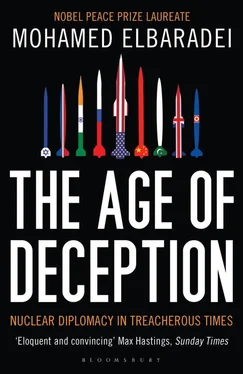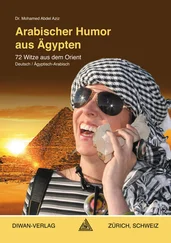George Jahn, “U.S. Alarmed Over Suspected Iran Nuke Site,” Associated Press, September 16, 2004.
BBC News, November 30, 2004.
The Group of 8 is a forum of major industrialized countries. Formerly known as the G-7, it included Canada, France, Germany, Italy, Japan, the United Kingdom, and the United States. It became known as the G-8 with the addition of Russia in 1997.
Robin Wright, “Bush Weighs Offers to Iran; U.S. Might Join Effort to Halt Nuclear Program,” Washington Post , February 28, 2005.
This was not the only difference. The Americans usually had definite views about how to interpret their raw information, whereas the British came across as less opinionated, letting the facts speak for themselves. Interestingly, my contacts at MI6 told me that, although the CIA director briefed the U.S. president each morning, the CIA, unlike MI6, was rarely involved during the actual decision-making process.
I was told that the genesis of the Libyan nuclear weapon program—and Gaddafi’s other WMD programs—was in retaliation for the April 1986 U.S. bombing raids during which Gaddafi’s adopted daughter, Hannah, was killed.
The rotor is the cylindrical hollow core of a centrifuge through which the uranium feedstock flows. Because these rotors must spin at extremely high speeds for long periods of time, they require high-precision manufacturing and advanced materials to withstand the resultant stresses.
“Libya Presses UN to Move Quickly to End Sanctions,” New York Times , January 2, 2004.
To our relief, the IAEA’s weapon experts determined that these weapon designs were missing important parts. A. Q. Khan was not a weapon designer, and he most likely passed to Libya whatever he was able to get hold of in Pakistan.
I believe Bolton was referring to statements such as declaring to a panel of the World Federalist Association, in 1994, “There is no such thing as the United Nations.” Bolton had gone on to say, “The Secretariat Building in New York has thirty-eight stories. If you lost ten stories today, it wouldn’t make a bit of difference.” Quoted in “Bolton: An Unforgivable Choice as UN Ambassador,” Council on Hemispheric Affairs, March 10, 2005, retrieved at www.scoop.co.nz/stories/WO0503/S00185.htm.
Jody Warrick, “U.S. Displays Nuclear Parts Given by Libya,” Washington Post , March 16, 2004. I am often amazed, and saddened, by discriminatory statements like this, made by intelligent, well-educated U.S. politicians, implying that the “civilized world” includes only a certain special group of nations. By inference, I would assume this means that other countries are to be considered “uncivilized.”
“Was Libyan WMD Disarmament a Significant Success for Nonproliferation?” by Sammy Salama, research associate, Center for Nonproliferation Studies, September 2004, accessed at www.nti.org/e_research/e3_56b.html.
A dirty bomb is very different from a nuclear weapon. Officially referred to as a “radiological dispersal device,” a dirty bomb would consist of conventional explosives packaged with nuclear or radioactive material.
Because a dirty bomb is much simpler to construct than a nuclear weapon, and because radioactive material is generally less well protected than weapons-grade nuclear material, the likelihood of a dirty bomb being used by terrorists is generally considered much higher than that of a nuclear weapon. Some experts have expressed surprise that a dirty bomb has not been used to date.
URENCO’s name derives from “uranium enrichment corporation.”
SCOPE, or Scomi Precision Engineering, is a subsidiary of the SCOMI Group, a company in the petroleum services industry. SCOPE’s primary business was to manufacture components that required high-precision machining (cutting, turning, milling, etc.) for vehicles or other engineered products.
The officials were from the Council for the Non-Proliferation of Weapons of Mass Destruction, an agency of the South African Government.
In 1993 the UN General Assembly adopted Resolution 48/75L, calling for the negotiation of a multilateral treaty to ban production of fissionable material for weapons. The negotiations remain stalled in the Conference on Disarmament in Geneva.
The Proliferation Security Initiative is a U.S.-led multinational program for the interdiction of ships at sea believed to be transporting nuclear materials. While many countries have signed on to the PSI, it is not conducted under the auspices of the United Nations, as one might expect of an initiative that claims authority over matters governed by international maritime law.
From 2001 to 2005, Joseph worked for Condoleezza Rice at the National Security Council, as the senior director for proliferation strategy, counterproliferation, and homeland defense. He was heavily involved with Bolton in the development of the Proliferation Security Initiative and in the negotiations to persuade Libya to give up its WMD.
Since Pakistan is not part of the Nuclear Non-Proliferation Treaty and also not a member of the Nuclear Suppliers Group subscribing to export control guidelines, it is not bound by the obligations of either.
Douglas Frantz, “From Patriot to Proliferator,” Los Angeles Times , September 23, 2005.
Frantz, “From Patriot to Proliferator.”
Seymour M. Hersh, “The Deal,” New Yorker , March 8, 2004.
Robert Einhorn was quoted in Douglas Frantz, “A High-Risk Nuclear Stakeout,” Los Angeles Times , February 27, 2005.
Mentioned in Hersh, “The Deal.”
Steve Coll, “The Atomic Emporium: Abdul Qadeer Khan and Iran’s Race to Build the Bomb,” New Yorker , August 2006.
At the time of my first election as Director General, in 1997, Egypt had put its support behind Mohamed Shaker, Egyptian ambassador to the United Kingdom and a close friend of President Hosni Mubarak’s family.
Duarte at the time was the Brazilian ambassador-at-large for disarmament and non-proliferation. He also served as ambassador to the IAEA.
The full account of the Al-Qa’qaa incident and its aftermath is given in chapter 3.
“IAEA Leader’s Phone Tapped,” December 12, 2004.
Reuters reporters later said they were shown by Western diplomats what was purported to be transcripts of intercepted telephone conversations that I had held with the Iranian ambassador to the IAEA. Lou Charbonneau, “Rice on WikiLeaks Spy Charges: We’re Just Diplomats,” Reuters, November 29, 2010.
My son, Mostafa, was a studio director at the time, working in the London offices of CNN. The news broke in the middle of his shift. He sent us a three-word text message: “Oh my God!”—then took a ten-minute break outside to regain his composure. He later told us he had fifty British pounds in his pocket, which he gave to the first beggar he saw.
Читать дальше












